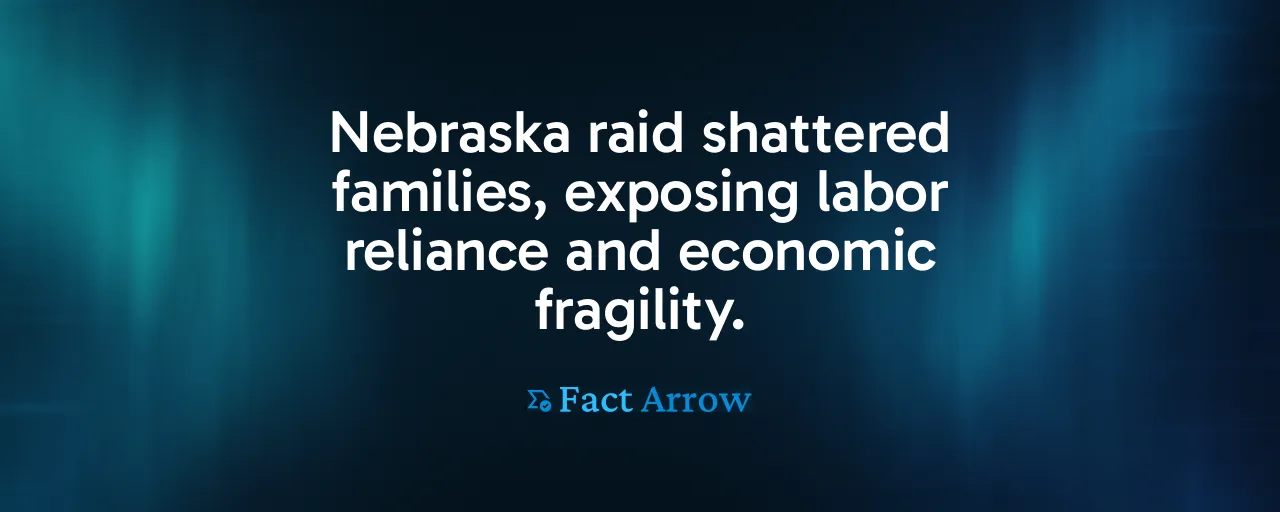A Community Upended
In June 2025, Immigration and Customs Enforcement swept through a Nebraska meat-processing plant, detaining over 70 workers. Families were torn apart overnight. Children faced uncertainty, and local businesses felt the ripple effects. The raid, hailed by some as a win for American workers, sparked a heated debate about who really benefits when undocumented immigrants are removed from the workforce.
Senator Eric Schmitt pointed to the raid as proof that American citizens will take these jobs. He argued that opening opportunities for locals is the solution. But the reality is messier. Many of the jobs at the plant remain unfilled, and the community is grappling with loss. The raid's impact extends beyond jobs, touching human lives and the systems that shape them.
The Jobs Nobody Wants
Undocumented workers make up a significant portion of the labor force in industries like meatpacking, agriculture, and construction. They account for over 15 percent of workers in crop farming and residential building. These jobs are grueling, dangerous, and low-paying. Long hours, hazardous conditions, and minimal benefits deter many citizens from applying, despite claims that locals are eager to step in.
Research from the Economic Policy Institute shows that mass deportations remove undocumented workers, which also eliminates jobs for native-born workers. For every million deportations, an estimated 88,000 citizens lose work due to disrupted supply chains. The Nebraska raid left the plant struggling to operate, with local applicants unable to fill the gap quickly or sustainably.
Economic Fallout Hits Hard
Raids like the one in Nebraska disrupt workplaces and shrink local economies. When workers are detained, consumer spending drops. Small businesses, from grocery stores to daycares, feel the pinch. Brookings research found that earlier enforcement programs, like Secure Communities, actually reduced native employment by destabilizing communities.
Food prices are another casualty. With fewer workers, production slows, and costs rise. Consumers, already stretched by inflation, face higher grocery bills. The ripple effects extend beyond the plant, touching every household. The narrative that these raids empower American workers persists, even as evidence points to broader harm.
Human Costs Demand Attention
Beyond economics, the human toll is staggering. Families face separation, with parents detained and children left in limbo. Communities live in fear, as legal immigrants and citizens alike worry about racial profiling. Pew surveys show most Americans recognize that immigrants take jobs others avoid. Policy often ignores this reality in favor of enforcement.
The 2019 Mississippi poultry raids offer a grim precedent. Hundreds of workers were detained, leaving schools scrambling to support traumatized children. Local economies tanked, and many jobs stayed vacant. The pattern is clear: mass enforcement creates chaos without addressing the root issues of labor demand or worker rights.
A Better Way Forward
Instead of raids, comprehensive immigration reform could stabilize the workforce. Legalization pathways for undocumented workers would protect families and boost tax revenue. Targeted visa programs for industries like agriculture and eldercare could match labor needs without exploitation. Higher minimum wages and stronger safety standards would make these jobs more appealing to all workers, regardless of status.
Historical efforts, like the 1986 Immigration Reform and Control Act, show that legalization can work. It granted amnesty to millions while setting new labor standards. Though imperfect, it reduced fear and strengthened communities. Pairing such reforms with investments in training and automation could ease reliance on vulnerable workers while supporting local economies.
Protecting Workers, Not Punishing Them
Enforcement targets exploitative employers. This approach avoids punishing workers. Companies that skirt labor laws and hire undocumented workers at substandard wages fuel this cycle. Stronger penalties for violations, coupled with independent oversight, could deter exploitation. Labor unions and worker advocates argue for policies that protect all workers, ensuring fair pay and safe conditions.
Phased approaches, like mandatory E-Verify paired with guest-worker programs, could balance accountability with practicality. Such measures address labor shortages while respecting the dignity of those who keep essential industries running. A shift in focus from punishment to fairness is essential.
Building a Stronger Future
The Nebraska raid and others like it reveal a broken system. Mass deportations do not solve labor shortages or empower American workers. They fracture communities, raise costs, and leave jobs unfilled. A different approach, rooted in fairness and pragmatism, addresses the complex realities of the modern workforce.
Legalization, fair wages, and targeted visas offer a path to stability. These solutions honor the contributions of all workers while strengthening local economies. Policymakers prioritize people over politics, recognizing that progress comes from inclusion, not exclusion.
As communities recover from the scars of raids, the choice is clear. America builds a system that values dignity and opportunity for everyone. By embracing reform and rejecting fear, the nation creates a workforce that lifts all boats, ensuring no one is left behind.
